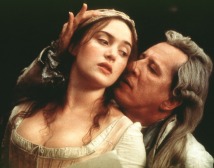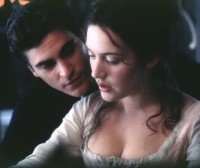|
Quills
|
| |
 |
USA,
2000. Rated R. 123 minutes.
Cast: Geoffrey
Rush, Kate Winslet, Joaquin Phoenix, Michael Caine, Billie Whitelaw, Patrick
Malahide, Amelia Warner, Jane Menelaus, Stephen Moyer
Writer: Doug Wright, based upon his play.
Music: Stephen Warbeck
Cinematographer: Rogier Stoffers
Producers: Julia Chasman, Peter Kaufman, Nick Wechsler
Director: Philip Kaufman
LINKS |
 ften
in films with historical subjects, details and facts are needlessly changed
to serve some Hollywood notion of salability, when the true story would serve
just as well. Fabrications and alterations to known historical events can be
jarring, wresting the viewer from the narrative’s spell. Most moviegoers, however,
are more lovers of tales well told than strict fact fetishists–that is, after
all, why they go to the cinema, one of the most engrossing storytelling media
yet devised.
ften
in films with historical subjects, details and facts are needlessly changed
to serve some Hollywood notion of salability, when the true story would serve
just as well. Fabrications and alterations to known historical events can be
jarring, wresting the viewer from the narrative’s spell. Most moviegoers, however,
are more lovers of tales well told than strict fact fetishists–that is, after
all, why they go to the cinema, one of the most engrossing storytelling media
yet devised.
Such prejudice for historical accuracy can easily lead to mistrust of Quills,
a film about the Marquis de Sade. Viewers who have read any of Sade’s works
and know something of his biography may fear that they will be unable to ignore
the film’s great lapses in historical verisimilitude (why, not even the words
uttered by the celluloid madman were from the actual Marquis’ quill, but the
screenwriter’s brain!). Fortunately, what has always been of greatest interest
about Sade is not his words (which are, as condemned by a character in the movie,
repetitive and poorly wrought), but the ideas those words engender. As for those
issues of historical accuracy, from the first gripping scene, which cleverly
manipulates the audience’s assumptions, they cease to matter. Quills
unspools its absorbing story, enticing the audience with humor and titillation
until it ensnares it with horror and pathos, then sends it home to ponder the
ramifications.
Adapted by Doug Wright from his play, Quills supposes to find the infamous
Marquis de Sade (Geoffrey Rush) imprisoned in Charenton insane asylum under
the care of the idealistic Abbé Coulmier (Joaquin Phoenix), who sees
no harm in allowing Sade to exorcise his lascivious demons on paper. Unbeknownst
to the abbé, a ripe young chambermaid named Madeleine (Kate Winslet)
smuggles Sade’s words out in her laundry basket to a waiting publisher’s assistant
and a ravenous public. The purloined letters cause such a stir that the Emperor
Napoleon soon hears of the outrageous stories. He orders them burned and the
Marquis executed. In an attempt to avoid adding to the long line of recent populist
martyrs, the emperor is persuaded to allow noted alienist Dr. Royer-Collard
(Michael Caine) to “reform” the errant nobleman by means more suited to the
Spanish Inquisition than the healing profession.
Incensed when he learns the Marquis has been abusing his freedoms by publishing
his writings, Abbé Coulmier implores him to rein in his creative urges
before the doctor clamps down on them all. Of course, Sade cannot be so easily
deterred and grows more offensive, taunting Dr. Royer-Collard by parading the
doctor’s own perversities (borne on the gossiping lips of servants to the Marquis’
ears) with a squirmingly hilarious play before the asylum and assorted visitors.
Fighting to maintain his control over the asylum, the abbé grows ever
more strict, depriving Sade of quills, ink, paper, and all the substitutes for
them that the writer fashions from his meals, clothes, and person. 
As the efforts to silence the Marquis tighten, the minds of those who read
his stories expand; some are freed, many more are scandalized. The mirror Sade
professes to hold up to the world with his words reflects more than the characters–from
high-spirited Madeleine to Dr. Royer-Collard’s erstwhile virginal wife to the
tormented Coulmier (who, Sade sees all too clearly, loves Madeleine with an
ardor beyond God’s grace)–can easily accept.
Here is where the magic of storytelling trumps all adhesion to historical fact.
Only the merest particulars of this film actually happened, but that doesn’t
prevent the story from ringing true. Quills captures what is perhaps
Sade’s only genius: the ability not merely to touch a nerve, but to yank on
it and give it a searing twist. Such affronts to hypocrisy and pious outrage,
and appeals to deep perversion and thirst for artistic freedom caused all manner
of real consequences–from the Marquis’ own almost-lifelong imprisonment to the
rise of the sexual cult that bears his name to the creation of incendiary art
that lives today with the likes of Marilyn Manson and Madonna. The film deftly
plucks all these chords and, while it has a clear preference for the preservation
of creative expression, never resorts to bloodless dogma. On the contrary, it
provides quite a bit of blood, along with every other bit of fluid and ordure
the human animal produces, expelled for every reason the human animal can devise:
passion, pain, joy, fear, mirth, hatred, and even love.
Whether genuinely mad, wickedly inspired, or–more likely–some combination of
the two, the Marquis, as zestfully portrayed by Rush, presents the mind of the
story. His ideas and the lengths to which he goes to express them are captivating
and inflammatory. Winslet’s voluptuous Madeleine, chaste but far from naïve,
gives the film its heart. Her indispensable goodwill toward the Marquis and
her love of the abbé leave them all open to destruction. Though it seems
trite to say so, Phoenix’s tender holy man provides the soul of the tale. In
his mission to shepherd the tormented spirits in his care, his presence counsels
tolerance regardless of understanding.
AboutFilm.Com
The Big Picture
|
| Alison |
A-
|
| Carlo |
B
|
| Dana |
A-
|
| Glenn |
-
|
| Jeff |
B+
|
| Kris |
-
|
| ratings explained |
The performances are uniformly outstanding. Geoffrey Rush is broad but believable.
He is, after all, portraying a real person as naked symbol and mewling id. It’s
a tall order he more than handily fills. Kate Winslet brings her oft-mentioned
luminosity, as well as her undervalued wit and warmth, to her supporting but
pivotal role. The surprise is Joaquin Phoenix. Proving that his layered performance
as the petulant, scheming Emperor Commodus in Gladiator
was no fluke (and that English accents improve with practice), Phoenix spreads
his wings and displays an impressive range. Gentle and idealistic, trusting
but not simple, he imbues the abbé with a grace that would be difficult
for many more celebrated actors to pull off. Michael Caine assays the doctor
with a natural demeanor and brisk, businesslike air that prevent the role from
being merely a cartoon villain.
No story so well fleshed-out as this one could possibly fall victim to the
arid mustiness that some expect of historical dramas. Further, director Philip
Kaufman (The Unbearable Lightness of Being, The Right Stuff) fully realizes
this film, saving it from the stilted talky-ness that plagues so many stage
plays adapted to the screen. There's a giddy naughtiness to the first act that
seems to twist and morph into the morbid debauchery of the last, leaving open
the question of where the responsibility for the outcome lies. The very end
is perhaps too patently ironic and predictable, but only because what has gone
before is so thrilling.
It is possible that a more factual rendering of the Marquis de Sade’s life
could be made into an engaging film. There is enough drama inherent in the details
of his existence to fashion a watchable, if rote, history. The greater art,
however, lies in probing Sade’s larger meaning and impact without leeching the
subject of its color and allure. Quills masterfully makes this artistic
reach beyond the facts and grasps the truth.
Review © December 2000
by AboutFilm.Com and the author.
Images © Fox Searchlight Pictures, Fox and any of its related entities.


